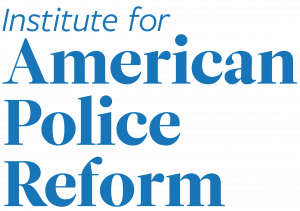The Institute for American Police Reform will release a White Paper with recommendations for a national standard for all policing authorities' use of force.
LEBANON, TENNESSEE, UNITED STATES OF AMERICA, June 3, 2022 /EINPresswire.com/ -- On May 25, 2022, President Biden signed an “Executive Order on Advancing Effective, Accountable Policing and Criminal Justice Practices to Enhance Public Trust and Public Safety”. The White House stated the order principally intends to a) Promote Accountability b) Raise Standards c) Support Law Enforcement with Improved Systems and Training d) Improve Data Transparency and Oversight of
New Technologies and e) Reform Our Broader Criminal Justice System. The direct order on changes in enforcement practices apply only to Federal Law Enforcement Agencies and not to local, county, regional, and state officers who comprise the overwhelming number of enforcement officers in the United States.The Institute for American Police Reform applauds the President’s intended goals in each of the categorized areas. It is an affirmative step toward addressing essential reform of American policing and provides promising considerations for changes in American policing. It is a limited step toward comprehensive police reform particularly relative to reform in peace officer use of force. States must rise to the call for comprehensive police reform beginning with peace officer use of force.
“Peace Officer” is a collective reference to police officers, deputies, federal agents, and any other local, county, regional, state, or federal official with policing or law enforcement authority. Existing legal standards on American peace officers’ discretion and permissibility in the use of force are extensively inconsistent and require comprehensive and principled-based reform.
A shift to national uniformity in principle-based laws and policies governing peace officer use of force is essential to ensure trustworthy and reliable policing in the United States. When systemically and comprehensively implemented, a new uniform standard will transform behaviors and practices in American policing. Peace officer reform must prioritize and inculcate the highest regard for all human life and dignity. An ethical and principled transformation of peace officer use of force will fortify citizens’ trust in policing services and assure policing officials are able to carry out their duties safely, consistently, and equally. A uniform use of force standard will re-establish a fundamental model of approbated public service where the sanctity of life is relentlessly safeguarded, human dignity is never compromised, and accountability is always demonstrated.
The following principles offer an ethical and reasonable path to reforming peace officer use of force.
1. Clear Necessity Must Dictate Use of Force.
Policing officials may only use force when it is absolutely necessary to do so for a lawful-policing purpose. When force is required, that force shall be only the minimum necessary in the circumstances. Once the necessity for force has ended, no additional force may be used.
2. The Force Used Must Be Proportional to the Threat.
Force shall only be lawful if it is proportionate to the threat posed by an offender and/or to the harm that a peace officer is seeking to avoid. Proportionality sets the parameter for appropriate use of force.
3. Precautions Must be Preplanned to Prevent Loss of Life.
The enforcement jurisdiction (local, county, state, federal) is duty bound to plan policing operations in a manner that minimizes the risk that officers will resort to the use of potentially unlawful force, especially lethal force.
4. The Preservation of Life is a Paramount Duty.
The prohibition against arbitrary deprivation of life is non-derogable. All police department/agency standards, policies and procedures, training and education, and practices shall be oriented to the inviolability of human dignity.
Policing reform grounded in these principles is required because the current varying standards governing states’ laws, departments, and agencies’ use of force policies lack essential, immutable principles. The guidelines for prevailing policies and practices largely derive from a single Supreme Court ruling that bestowed officers with immense discretion in determining when use of force is reasonable – instead of when use of force is necessary. This holding has led to fragmented use of force training among the states and has left peace officers with murky guidance on what force is Constitutionally and ethically permissible. As a result, existing statutes and policies create unethical practices that focus primarily on peace officer conduct that is legally defensible, rather than conduct based on unyielding principles intended to preserve human life, respect human dignity, and promote accountability.
The Institute for American Police Reform (IAPR) is a nonpartisan, not-for-profit organization that provides guidance for police reform in its Five Pillars of Police Reform©: (1) policing laws and policies; (2) peace officer accountability; (3) community engagement and education; (4) peace officer leadership development; and (5) policing standards, education, and training. IAPR’s value statement is that “Police are essential. So is reform.” The reform of peace officer use of force is a central focus in the transformation of American policing.
Next week IAPR will release a White Paper that details the historical evolution of peace officer use of force, discusses relevant Supreme Court jurisprudence, and analyzes state laws and enforcement-entity policies authorizing the use of force. The paper examines essential guiding principles and cites examples of laws and policies governing use of force standards that successfully incorporate such principles. The paper also presents IAPR’s recommended model peace officer use of force policy.



No comments:
Post a Comment